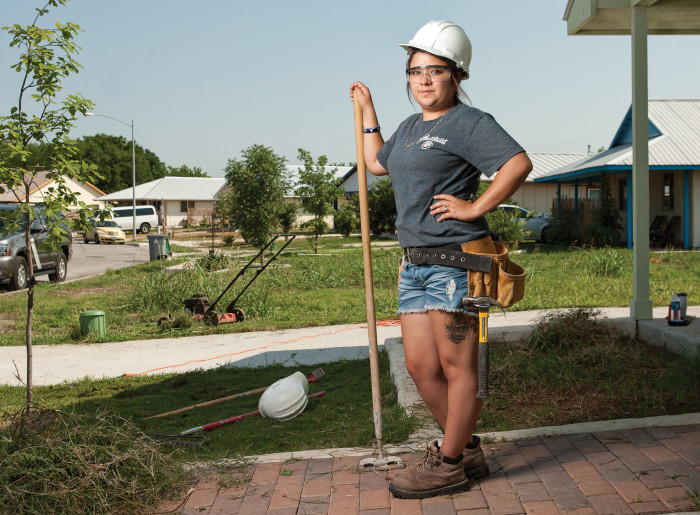Walking into the main building that makes up part of the American YouthWorks campus, it’s easy to glimpse the many facets of work going on there. A modest office and lobby area gives an initial impression of a smaller building, but walk the long corridor running the length of the school and you’ll marvel at its length, lined with students’ work, awards, and an old wooden airplane that students made fly.
For most of the students who attend the program, American YouthWorks offers a second chance and a means of empowerment. For those who happen to be LGBT, it can be a vital environment of unconditional acceptance.
Marisol Hernandez, a current American YouthWorks student, is a shy, petite 18-year-old who enrolled there about a year ago. Before enrolling, Hernandez admits that her relationship with school was on-again, off-again, having dropped out of Travis High School when she was 15. She now identifies as a lesbian now, but at the time she had a boyfriend who was a bad influence.
“I was doing good my freshman year, I was passing classes, and I was part of the ROTC,” Hernandez said. “My boyfriend at the time, he was locked up, and when he got out, everything went downhill. I ran away to San Antonio for six months, then (I) came here. I got a job, then dropped out again, because I was like, ‘I have a job.’ Then I was out of school for two years and I finally came back…and I just kept coming to school.”
Now she’s on track to graduate with work experience and a high school degree, and wants to join the Marines. Hernandez said that, as a lesbian, she has not experienced discrimination or bullying within the American YouthWorks programs—in contrast with her experiences elsewhere.
American YouthWorks, which serves about 125 students a year, offers education, service and green-jobs training. Now more than 30 years old, the organization has prepared thousands of students who might have otherwise dropped out of the educational system a way to finish their high school education and get job training. Aside from the public charter high school and GED program it operates, the nonprofit runs green-jobs training and several “corps” programs that give students hands-on experience in green fields.
Sharon Yarbrough, the development coordinator, said the organization focuses not only on providing jobs training, but training in fields that yield high-income growth potential. Within its construction corps, for instance, the focus is on green building, an industry that’s seen a growing demand for skilled workers in recent years. Aaron Lee, an openly gay board member, said the organization plans to augment its computer and tech training and start adding some medical training.
Providing jobs training not only helps give students a boost in the job market, it can also help eliminate barriers to finishing a high school education. For instance, American YouthWorks also runs a daycare so that students with children don’t have to choose between work and school or childcare.
A partnership with Americorps and Austin Community College gives American YouthWorks students access to vocational training. A mentor program also gives students access to information they might not otherwise have, Yarbrough added.
All too often, students with fewer socioeconomic advantages may not know about the myriad career opportunities they can investigate. Mentors who can show students what a certain industry or field is all about help open doors by showing them there are jobs that fit their interests.
“It’s about getting kids who were about to fail, getting them back in the system, and getting them educated,” Lee said. “And that’s just huge, to see the kids graduate, knowing the hurdles and family backgrounds they’ve come from, that’s my favorite time of every year—graduation.”
The organization has to do very little recruiting. In fact, it has a wait list and gets most of its students, like Hernandez, through word of mouth. American YouthWorks is in contact with high school counselors around Austin, who encourage students to give its programs a try before giving up on the system altogether.
And it’s about an environment that fosters and encourages acceptance. Elsbeth Teague, an Americorps member working in American YouthWorks’ Environmental Corps Crew, said being gay hasn’t been an issue at all—but if it came up, she’s confident that any intolerance would be confronted immediately.
“You’re always looking for somewhere where you won’t be persecuted,” Teague said. “This is one of those places.”
American YouthWorks
• American YouthWorks has been operating for 30 years
• 100 students participated in workforce training each year
• Approximately 60 students complete their GED each year with American YouthWorks




































